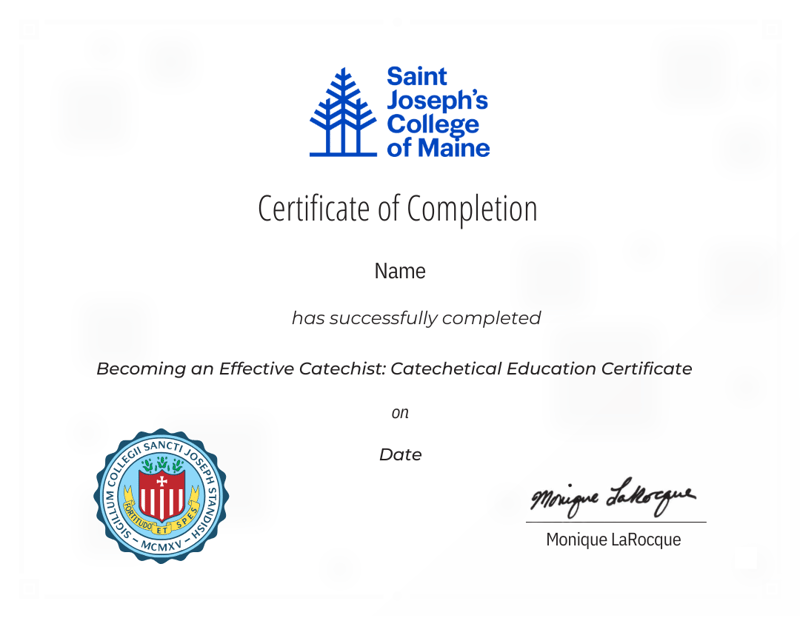The Adaptive Classroom:
Course Enrollment
Who is This Program For?
This credential is designed for the Catholic school teacher and assistant teacher that would like to enhance their knowledge in special education best practices and techniques to ensure inclusion and success for all learners. This credential will equip teachers with the knowledge in understanding how neurodivergent brains learn and provide tools to develop skills to teach a wider scope of learners. Knowledge will be gained in the areas of specific learning disabilities, strategies for meeting the needs of an academically diverse classroom, and church doctrine that support the reasons why all students should be included in Catholic schools.

Representative Job Titles
-
Classroom Teacher
-
Special Educator
-
Teaching Assistant
-
Mentor Teacher
-
Lead Teacher
-
Educator Coach
Why Choose a Career in Teaching Children with Disabilities?
The Importance of Teaching
Course Overview
This credential will equip teachers with knowledge to understand how neurodivergent brains learn and the skills needed to teach a wider scope of learners. Knowledge will be gained in the areas of common learning disabilities, strategies for meeting the needs of an academically diverse classroom, and church teachings and documents that support the reasons why all students should be included in Catholic schools.
Teachers will learn topics in:
- Catholic teaching applied to school mission and social teaching
- Understanding of the most common learning disabilities
- Educational law and practice in student services and supports in the Catholic school environment
- Accommodations, modifications, inventions to aid learns in daily tasks and curriculum
- Goal setting through the use of classroom and school wide data
- Best practices in collaboration with parents and colleagues in the goal setting process
- Engagement strategies, assistive technology resources and environmental factors that can increase learners’ accessibility to the curriculum
- Flexibility in assessments for student success
- Development of action plans for the classroom and school wide planning
Module 1: Catholic Mission in Education and Communicating with Compassion. Teachers learn why inclusion of persons with disabilities is related to mission, how it benefits the community, and the start of their work in using these values in the classroom with lessons through Church doctrine and Catholic social teaching.
Module 2: Who is in your classroom? Overview of High and Low Incidence Disabilities. Teachers will focus on the most prevalent learning disabilities, their characteristics, how they present in the classroom. Traditional special education law and practice will be considered as a foundation for implementing meaningful student services and supports in a Catholic school environment.
Module 3: Accommodations, Interventions, and Modifications. Teachers will learn a variety of accommodations and interventions that can be provided to aid learners in daily tasks, in addition to how modifications are different from accommodations and interventions, and when they might be used.
Module 4: Let Goal Setting and Data Be Your Guide. Data is collected school wide and in each individual classroom. When considered in isolation it only represents a small piece of the whole. However, when data is analyzed at the classroom and school wide levels, goals drive the growth of the individual learners, the educators, and the school at large. Examples of classroom and school wide data will be presented and analyzed to develop data driven goals.
Module 5: Collaboration for Success. Teachers will learn the importance of collaboration with parents and colleagues for learners to meet academic, social and emotional, and developmental goals. Scenarios will be presented describing challenges, barriers, and successful collaborative experiences in alignment with the academic impact of learning disabilities.
Module 6: Strategies to Increase Accessibility and Engagement for Learners. Whether online, in the classroom, or in a hybrid model, learners must be able to access the content and engage in the lessons to achieve the teacher directed goals. Teachers will learn engagement strategies, assistive technology resources and environmental factors that can increase learners’ accessibility to the curriculum.
Module 7: Effective and Flexible Assessment. Students can show what they have learned in a variety of ways. This module will provide examples of why flexibility in assessment increases the possibility of success for students with learning disabilities.
Module 8: Setting Them Up for Success. Action plans can drive meaningful outcomes. The teacher will consider what is currently in place on his/her school campus, determine the necessary components for a student-focused action plan, and the resources necessary to implement the plan with success. This module will also include the necessary steps to take if a plan is not currently used at the school campus and needs to be created.
Subject Matter Experts
Colleen McCoy-Cejka, M.A. is the co-founder of Inclusion Solutions, LLC and Ed-21 Solutions, companies dedicated to school improvement at every level. Building upon a professional career as an educator, principal, assistant superintendent, curriculum director, and leader of professional learning at the National Catholic Education Association, Colleen connects educators and leaders with the resources and information they need to succeed. Colleen was the driving force of inclusive practices within the Diocese of Phoenix. She hopes to share and build upon the practices initiated in Phoenix with school leaders committed to widening the circle. She is a founding board member of The Matthew 19:14 Project and a board member for the National Catholic Partnership on Disability.
Crystal Brooks, M.A., CCC-SLP, is the co-founder of Inclusion Solutions, a company dedicated to furthering the implementation of inclusive practices. Building upon a professional career as a practitioner, educator, state agency specialist, local and national presenter, and Catholic school leadership team member, Crystal empowers school leaders and educators to reach the goal of an inclusive educational community where all students are welcome.
Still Have Questions?
This is a six-week program that will require about 5 to 6 hours of dedicated time per week.
No. Micro-credentials are not transferrable for credit. These are skills-based training programs that differ from a traditional college course.
No, there are no assignment deadlines. There is, however, a prescribed pace for timely completion as learners will have a set number of weeks to complete the credential.
Micro-credentials are self-paced and do not require the learner to attend class at a certain time each week. Learners should expect to spend 5-6 hours per week engaging with the course at their own pace. Select weeks will have optional webinars featuring industry experts.
Students will receive a certificate of completion.

Please feel free to use any of these options to reach out to us. We would love to hear from you!
- Call us at: 508-925-4762
- Email us at: SJCadmissions@focusedusolutions.com
- Fill out the form at the bottom of this page
- Use the chat to connect with one of our counselors
Want to learn more?
.png?width=200&height=102&name=SJC_Logo_Stack_rev%20(1).png)
.png?width=400&height=131&name=New%20LOGO1%20(002).png)